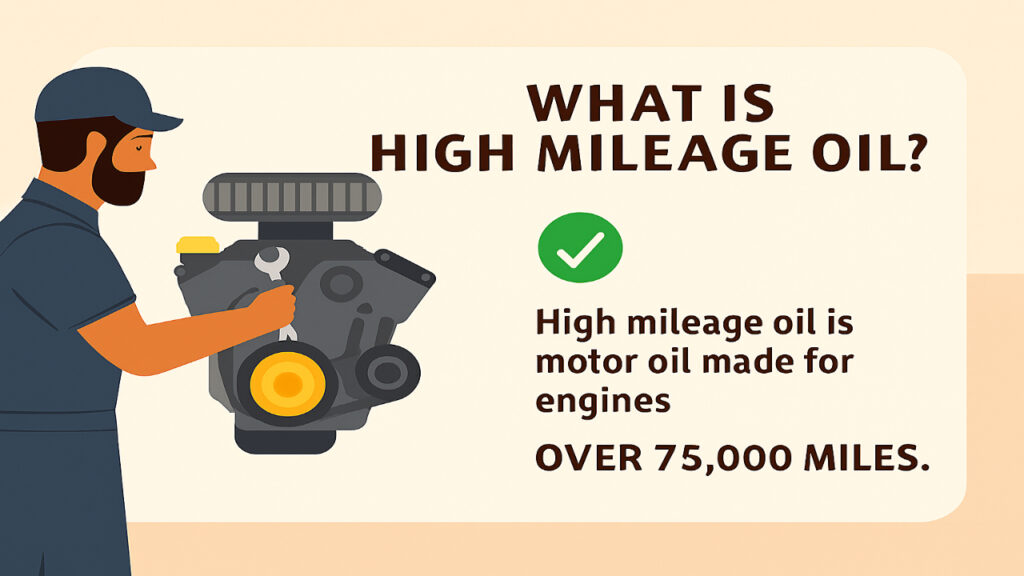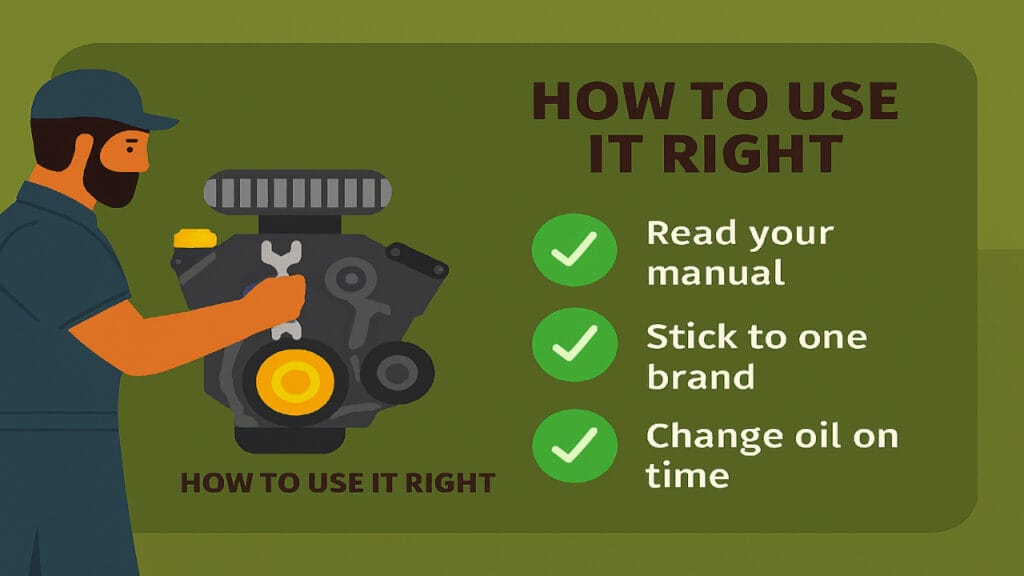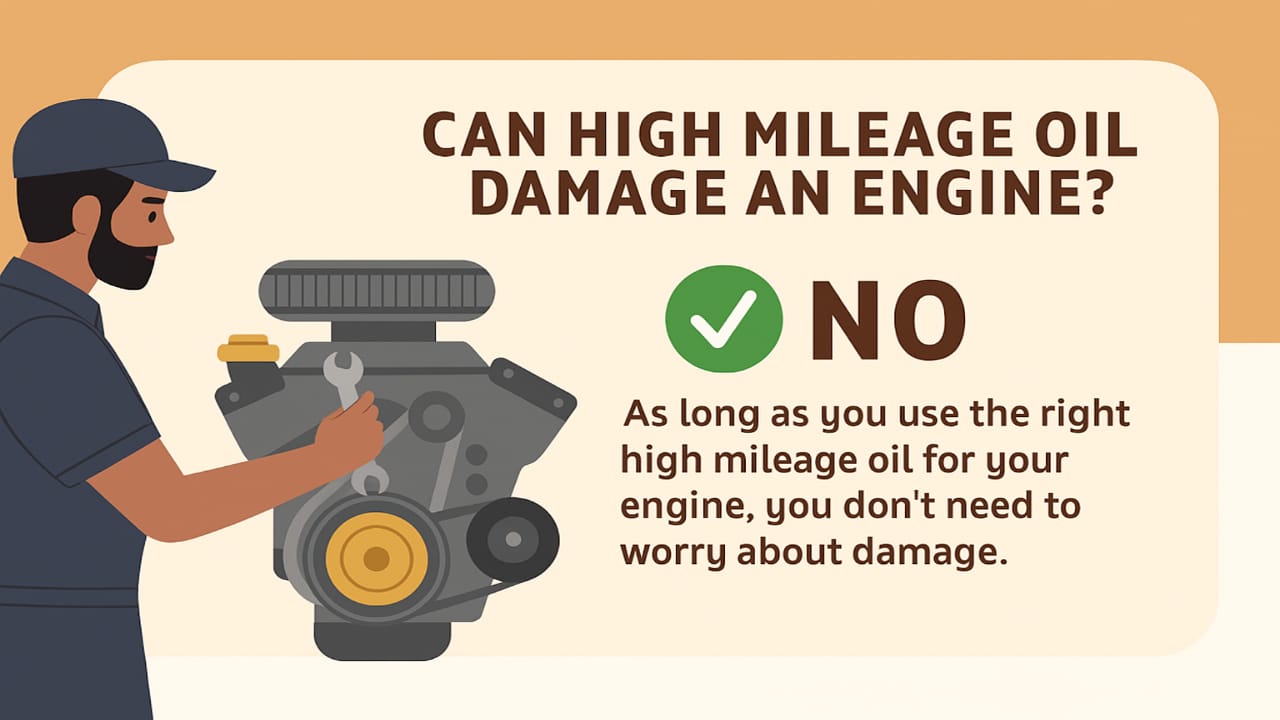Look—if your car’s got more than 75,000 miles on it (and let’s be real, most of us are driving cars way past that), you’ve probably stood in the oil aisle staring at those “High Mileage” bottles, wondering:
“Is this stuff gonna help… or actually wreck my engine?”
Here’s the straight truth: No, high mileage oil won’t hurt your engine. Not if you use the right kind. In fact, for older cars? It usually does more good than harm.
Let’s cut through the marketing noise and talk about what actually matters.
What is High Mileage Oil?

It’s not just a trick to get you to spend more. High mileage oil is basically regular motor oil—but with a few extra helpers mixed in to deal with the little problems that pop up as engines get older.
All oil does three things, no matter what kind:
- Keeps parts slippery so they don’t grind each other down
- Helps cool hot spots inside the engine
- Washes away dirt, carbon, and gunk
High mileage oil does all that—and throws in a few bonuses.
The Extra Things It Brings to the Table
Seal conditioners
Over time, the rubber seals around your engine dry out. They shrink. They crack. That’s why you start seeing those little oil spots under your car.
High mileage oil has special stuff in it that softens those old seals just enough to help them puff back up a bit and close small gaps.
Just so you know—it won’t fix a seal that’s already torn in half. But it can slow down those annoying slow drips.
Stronger detergents
If you do a lot of short trips (like school runs or quick errands), your oil never gets hot enough to burn off moisture. That leads to sludge—thick, black, tar-like gunk. Sludge clogs up oil passages and can leave parts starved for lubrication.
High mileage formulas pack in extra cleaning power to break that junk down and keep things flowing like they should.
Anti-wear additives
As engines age, tiny bits wear down. That means more metal rubbing on metal. Not good.
So these oils often include extra zinc or similar additives that lay down a thin, invisible shield on engine surfaces. Less grinding = less wear over time.
Viscosity stabilizers
Oil naturally gets thinner when it’s hot and thicker when it’s cold. That’s just physics.
But high mileage oils use special modifiers to keep the thickness more consistent—so whether it’s freezing out or blazing hot, your engine still gets proper protection at startup and under load.
You can find it in conventional (cheaper, totally fine for everyday driving) or full synthetic (lasts longer, better if you live in extreme weather or tow heavy loads).
Does It Actually Help?
If your car’s starting to show its age, switching can make a real difference:
- Fewer oil spots on the driveway
- Less need to top off between oil changes
- Cleaner engine internals
- Quieter, smoother running
- Potentially more miles before major repairs
But let’s not kid ourselves: It’s not a magic potion.
If your engine’s knocking like a woodpecker, blowing blue smoke, or burning through a quart of oil every few hundred miles - you’ve got a mechanical problem. No oil on the shelf is going to fix that. You’ll need a mechanic, not a new bottle.
Can It Damage an Engine?

NO, These oils meet the exact same industry standards as any other motor oil—like API SP or ILSAC GF-6. That means they’ve been tested in real engines to make sure they won’t cause harm, no matter how many miles your car’s got.
What if I use it in a brand-new car?
It won’t break anything. But it’s kind of like wearing a knee brace when your knees are perfectly fine—unnecessary.
New engines don’t have dried-out seals. They don’t have sludge. They’re built to run on the specific oil your owner’s manual calls for (usually something light like 0W-20 synthetic).
So yeah, you can use high mileage oil in a new car… but you’re just paying extra for stuff you don’t need yet.
Any Risks? (Let’s Be Real)
Honestly? Almost none. But here’s what could happen in rare cases:
- If a seal is already badly torn, the conditioners might make it swell unevenly and leak more. But let’s be clear—the seal was failing anyway. The oil didn’t cause it.
- If you use the wrong weight—say, 10W-40 in a car that needs 5W-30—you might get poor fuel economy or hard cold starts. But again, that’s true for any oil, not just high mileage.
- Topping off with a different brand or type once in a while? Totally fine. Just don’t make it a habit if you can avoid it.
When Should You Switch?
Think about making the jump if:
- Your odometer reads 75,000 miles or more
- You’re adding oil between changes
- You see small oil spots where you park
- The engine sounds rougher, louder, or just “off”
- Your mechanic says there’s sludge in there
If your car’s under 50,000 miles and running like a dream? Stick with what your manual says. No need to switch early.
Let’s Bust a Few Myths
“High mileage oil ruins new engines.”
Nope. It’s safe—but it’s like putting premium gas in a car that doesn’t need it. Wasteful, not dangerous.
“It’ll fix a smoking or knocking engine.”
Sorry, but oil can’t rebuild worn piston rings or seal a cracked head. If it’s broken, it’s broken.
“All high mileage oils are the same.”
Not even close.
- Mobil 1? Heavy on synthetic performance and heat resistance
- Castrol? Puts extra focus on seal conditioning
- Valvoline? Boosts anti-wear protection
- Pennzoil? Really good at fighting sludge
Check the back of the bottle—you’ll see they’re not identical.
How to Use It Right (Without Wasting Money)

- Open your owner’s manual. Find the oil weight (like 5W-30) and spec (API SP, Dexos1, etc.). Match it.
- Stick with big-name brands. Mobil 1, Castrol, Pennzoil, Valvoline—they actually test their stuff.
- Change it on time. Usually every 5,000–7,500 miles. If you drive in dust, extreme temps, or mostly short trips? Go a little sooner.
- Don’t ignore real problems. If you’re losing oil fast or hear weird noises, see a mechanic. Oil isn’t a cure-all.
- When in doubt, ask. A good shop can check your oil consumption and engine health in 10 minutes.
Conclusion
High mileage oil isn’t magic. It won’t turn your 2008 Corolla into a Tesla.
But it is one of the simplest, cheapest ways to give an aging engine a little extra care.
It won’t hurt your car.
It won’t fix what’s already broken.
But used right? It might just help you get another 50,000 reliable miles out of the vehicle you already own.
So don’t overthink it.
Match the oil to your car’s needs.
Change it when you’re supposed to.
And stop worrying—your engine’s probably just fine.
FAQ's
Not directly. But a clean, well-lubed engine runs smoother - and that helps keep your fuel economy from dropping.
If you live where it’s super hot or cold, tow a trailer, or just want to stretch your oil changes a bit - yes.
Most high mileage oils are for gas engines only. Diesels need different additives (look for API CK-4 or FA-4 on the label). Always double-check.
The best engine cleaner oil additive safely removes sludge and deposits without harming seals - use it before an oil change for optimal results in high-mileage or neglected engines.
High mileage oil’s main disadvantage is it’s unnecessary - and more expensive - for newer engines with no wear, leaks, or sludge, offering no added benefit over standard oil.

